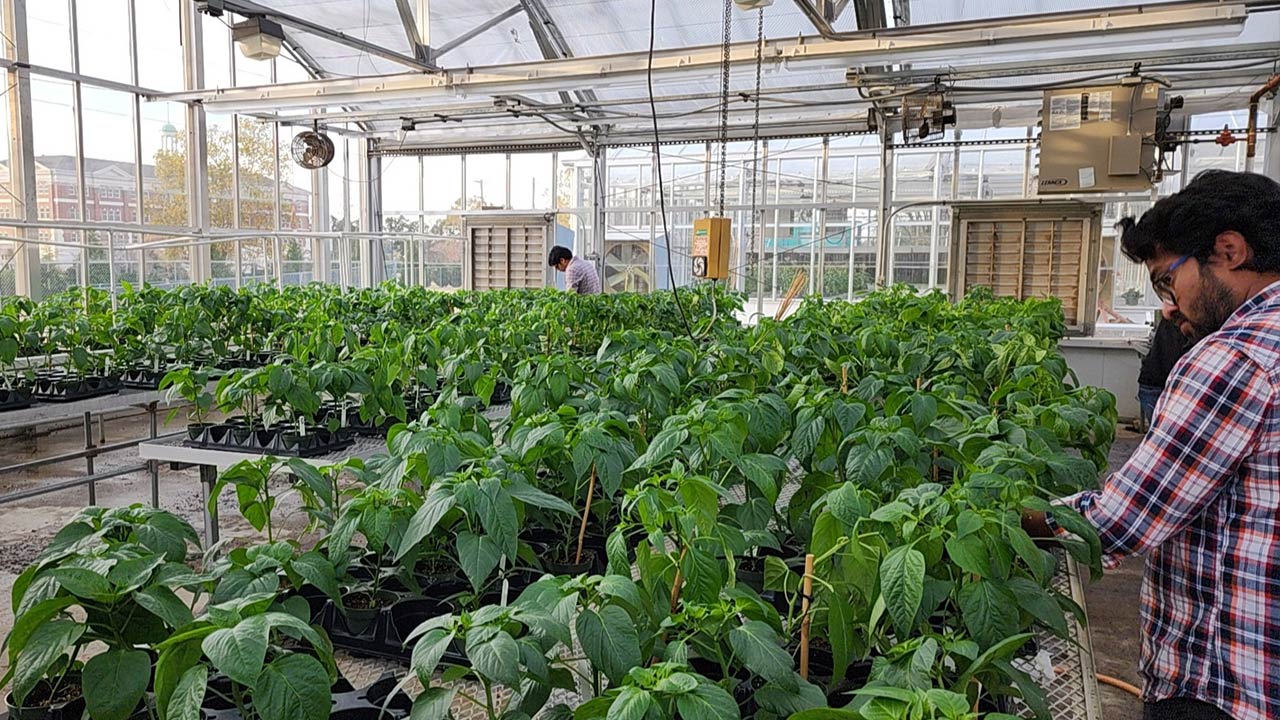content body

Associate Professor Neha Potnis has received more than $2 million in grants to investigate plant-bacterial interactions
Just as we deal with flu season rolling around every year, plants too face diseases that resurface annually with new variants that can wreak havoc on their health. Plants may not have medical doctors and vaccines to protect them, but they do have Neha Potnis. As an associate professor in Auburn University’s College of Agriculture, Potnis studies how plants and their bacterial threats co-evolve.
“These complex interactions can tell us how pathogens establish infections in plants,” Potnis said. “This basic knowledge is important for protecting plants against living and nonliving stressors.
Potnis, an expert in plant-microbe relationships, focuses her research on agricultural systems, where large plots of single crops are especially vulnerable to deadly diseases that can leave a serious dent on the food industry.
Over the past seven years, Potnis has received more than $2 million in grants from the Foundation for Food and Agricultural research, National Science Foundation, USDA and Auburn University to study bacterial diseases that infect a variety of crops. Much of her research focuses on bacterial spot, which is caused by different species of the bacteria Xanthomonas. The disease is commonly found in tomato and pepper plants, where it shows up as brown lesions on the leaves and fruits.
“Anywhere you go outside into a garden, you are going to find this disease,” Potnis said. “But why does this disease keep occurring year after year, why do some fields get hit more severely than others, and what changes every time the pathogen presents itself to the plant?”

Students in Neha Potnis’s laboratory assess different pepper lines for their resistance against bacterial spot pathogen by inoculating the plants with the pathogen in the greenhouse. Left: Rishi Bhandari; Right: Palash Ghosh.
To answer these questions, Potnis takes a closer look at the molecular moves played by pathogens, plants — and their associated microbes.
In collaboration with researchers across the Southeast, Potnis has been tracing the entire DNA pool of microbes and pathogens present in the field: data that allows the researchers to gauge the relative presence of different pathogen variants to identify a dominant strain to target.
This strategy also allows them to examine how different pathogens elicit changes in the plant’s microbiome — its associated community of bacteria and fungi that help it fight off diseases. She zooms in on the specific molecular interactions that allow bacterial infections to take hold, focusing on the different weapons of destruction that Xanthomonas uses to inject toxins into its host.
Potnis and her team have discovered that plants often face a combined threat of multiple disease strains at once, meaning they can’t just focus resistance treatments on one variant. With the help of a $500,000 grant from the Foundation for Food and Agricultural Research she received in 2019, Potnis is now investigating a new strategy: identify a weakness common to all the pathogen’s variants to take them all down at once.
“That’s our long-term goal — to target these weaknesses,” Potnis said. “Our findings show that we have to change our disease management strategy and look at multiple different variants at once.”
Pathogens aren’t the only plant threat Potnis is concerned with, however. Plants don’t live in a bubble, so Potnis is driven to understand how plants respond to dynamic conditions. This line of her research is aided by the Atmospheric Deposition Laboratory’s open-top chamber system, where she can change climate parameters such as ozone to see how the plants’ immune response changes under different environmental conditions.
Her team’s research has shown that the community of microbes that makes up the plant’s defense changes drastically under stressful environments, adding yet another factor to consider in their treatment.
“The undergraduate research was a career-changing experience for me. I want my students to have the same opportunity."
In this sense, fighting endemic plant pathogens isn’t as simple as developing new flu vaccines every year. But plant and human pathology do share a common goal, Potnis said: to protect the host by predicting how pathogens will evolve.
Down the road, Potnis hopes her research insights will help other scientists develop targeted strategies to bolster plants’ resistance to different threats and reduce disease incidence in the field. The strategy: if they can identify the main pathogenic weaknesses, they could selectively propagate plants that naturally fight those defects — or adjust the plant’s microbial cocktail to boost its immunity directly.
Thankfully, she doesn’t have to fight alone.
Potnis relies on her “workhorse” team of undergraduate, graduate students and postdoctoral researchers to help her conduct experiments — and she even sponsors a summer program for high school students sponsored by the National Science Foundation Faculty Early Career Development grant she received in 2020. In her time at Auburn since 2016, Potnis has worked with more than 24 students in her lab, including 11 undergraduate students.
“The undergraduate research was a career-changing experience for me,” Potnis said. “I want my students to have the same opportunity.”
Read more about research being conducted in the Auburn University College of Agriculture.
Learn more



